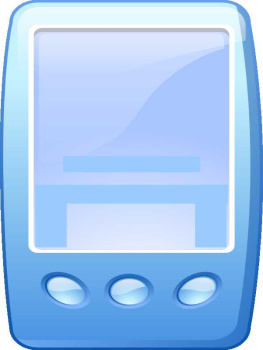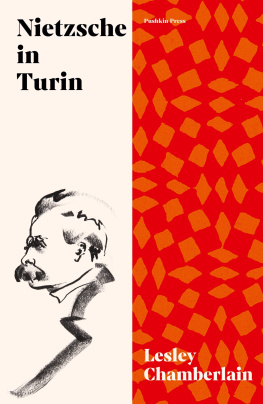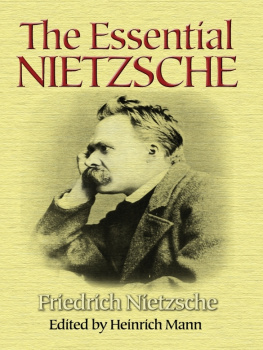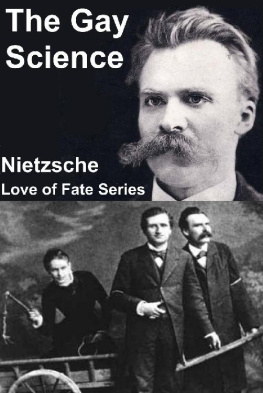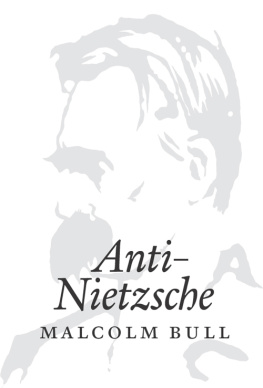Nietzsche Friedrich - Ecce Homo
Here you can read online Nietzsche Friedrich - Ecce Homo full text of the book (entire story) in english for free. Download pdf and epub, get meaning, cover and reviews about this ebook. genre: Science. Description of the work, (preface) as well as reviews are available. Best literature library LitArk.com created for fans of good reading and offers a wide selection of genres:
Romance novel
Science fiction
Adventure
Detective
Science
History
Home and family
Prose
Art
Politics
Computer
Non-fiction
Religion
Business
Children
Humor
Choose a favorite category and find really read worthwhile books. Enjoy immersion in the world of imagination, feel the emotions of the characters or learn something new for yourself, make an fascinating discovery.

- Book:Ecce Homo
- Author:
- Genre:
- Rating:4 / 5
- Favourites:Add to favourites
- Your mark:
- 80
- 1
- 2
- 3
- 4
- 5
Ecce Homo: summary, description and annotation
We offer to read an annotation, description, summary or preface (depends on what the author of the book "Ecce Homo" wrote himself). If you haven't found the necessary information about the book — write in the comments, we will try to find it.
Ecce Homo — read online for free the complete book (whole text) full work
Below is the text of the book, divided by pages. System saving the place of the last page read, allows you to conveniently read the book "Ecce Homo" online for free, without having to search again every time where you left off. Put a bookmark, and you can go to the page where you finished reading at any time.
Font size:
Interval:
Bookmark:

F RIEDRICH N IETZSCHE was born near Leipzig in 1844, the son of a Lutheran clergyman. He attended the famous Pforta School, then went to university at Bonn and at Leipzig, where he studied philology and read Schopenhauer. When he was only twenty-four he was appointed to the chair of classical philology at Basle University; he stayed there until his health forced him into retirement in 1879. While at Basle he made and broke his friendship with Wagner, participated as an ambulance orderly in the Franco-Prussian War, and published The Birth of Tragedy (1872), Untimely Meditations (18736) and the first two parts of Human, All Too Human (18789). From 1880 until his final collapse in 1889, except for brief interludes, he divorced himself from everyday life and, supported by his university pension, he lived mainly in France, Italy and Switzerland. The third part of Human, All Too Human appeared in 1880, followed by The Dawn in 1881. Thus Spoke Zarathustra was written between 1883 and 1885, and his last completed books were Ecce Homo, an autobiography, and Nietzsche contra Wagner. He became insane in 1889 and remained in a condition of mental and physical paralysis until his death in 1900.
R. J. H OLLINGDALE translated eleven of Nietzsches books and published two books about him; he also translated works by, among others, Schopenhauer, Goethe, E. T. A. Hoffman, Lichtenberg and Theodor Fontane, many of these for penguin Classics. He was the honorary president of the British Nietzsche Society. R. J. Hollingdale died on 28 September 2001. In its obituary The Times described him as Britains foremost postwar Nietzsche specialist and the Guardian paid tribute to his inspired gift for German translation. Richard Gott wrote that he brought fresh generations through fluent and intelligent translation to read and relish Nietzsches inestimable thought.
M ICHAEL T ANNER was educated in the RAF and at Cambridge University, where he was a Lecturer in Philosophy until 1997 and is a Fellow of Corpus Christi College. He is equally interested in philosophy, music and literature, his particular areas being Friedrich Nietzsche and Richard Wagner. He has written for many journals, contributed The Total Work of Art to The Wagner Companion, and is the author of Nietzsche (1995) and Wagner (1996).
FRIEDRICH NIETZSCHE
How One Becomes
What One Is
Translated with Notes by
R. J. HOLLINGDALE
Introduction by
MICHAEL TANNER
PENGUIN BOOKS
PENGUIN BOOKS
Published by the Penguin Group
Penguin Books Ltd, 80 Strand, London WC 2 R 0 RL , England
Penguin Group (USA) Inc., 375 Hudson Street, New York, New York 10014, USA
Penguin Books Australia Ltd, 250 Camberwell Road, Camberwell, Victoria 3124, Australia
Penguin Books Canada Ltd, 10 Alcorn Avenue, Toronto, Ontario, Canada M 4 V 3 B 2
Penguin Books India (P) Ltd, 11 Community Centre, Panchsheel Park, New Delhi 110 017, India
Penguin Books (NZ) Ltd, Cnr Rosedale and Airborne Roads, Albany, Auckland, New Zealand
Penguin Books (South Africa) (Pty) Ltd, 24 Sturdee Avenue, Rosebank 2196, South Africa
Penguin Books Ltd, Registered Offices: 80 Strand, London WC 2 R 0 RL , England
www.penguin.com
This translation first published 1979
Reprinted with new introduction 1992
Reprinted with a Chronology amd Further Reading 2004
Translation copyright R. J. Hollingdale, 1979
New introduction copyright Michael Tanner, 1992
All rights reserved
Except in the United States of America, this book is sold subject to the condition that it shall not, by way of trade or otherwise, be lent, re-sold, hired out, or otherwise circulated without the publishers prior consent in any form of binding or cover other than that in which it is published and without a similar condition including this condition being imposed on the subsequent purchaser
9780141921730
ECCE HOMO
HOW ONE BECOMES WHAT ONE IS
Ecce Homo is the title of Friedrich Nietzsches autobiography. Almost certainly it is the most bizarre example of that genre ever penned. Its oddness begins with the title, which is a clear reference to St Johns Gospel, where it is narrated that Pilate brought Jesus out with his crown of thorns for the Jews to see, and said to them: Behold the man! So Nietzsche is evidently comparing himself to Christ, and whether seriously or in jest, the comparison remains equally blasphemous. But the subtitle is bewildering, and in a peculiarly Nietzschean way: one needs to read the whole book to see what it means and then to read Nietzsches other books to see what it really means.
How one becomes what one is. Immediately several questions spring to the readers mind. For instance: how could one fail to be what one is in the first place? So how can it make sense to say that one becomes what one is? And supposing that is what happens, can Nietzsche really tell us how it comes about, as his subtitle promises? And why what one is? Is it significant, as one uneasily feels it must be, that Nietzsche says what rather than the more expectable who? Thus in a state possibly of outrage and certainly of puzzlement, one moves on to the contents page where more surprises are waiting: the first three chapters are called Why I am So Wise, Why I am So Clever and Why I Write Such Good Books; the remainder are the titles of almost all of Nietzsches books, except for the last chapter, Why I am a Destiny.
Either, one suspects, this is a joke of a rather heavy-handed Teutonic variety, or Nietzsches madness, which is usually thought to have begun pretty abruptly early in January 1889, was actually under way while he was writing this book during the autumn of 1888. Neither of these suspicions is without foundation, but there is more to it than that. Though Nietzsche had no idea that this was to be his last book, indeed was full of plans for further ones, he seems to have felt that a point had been reached in his life and his work where a retrospective celebration was in place. By this time in his writing he was more fascinated than he had ever been by the possibilities of parody, and the traditional form of autobiography must have been enormously attractive. For what are autobiographies, in general, but prolonged celebrations of the achievements of their authors? The very idea of writing ones autobiography could be said to be megalomaniac; one is assuming that ones life is either sufficiently exemplary or sufficiently idiosyncratic to be worth retailing for general consumption. The lack of explicit self-congratulation that is one of the conventions of the form is merely a device for getting readers to note how modesty, too, is a quality the author has, besides all the others that emerge from his accounts of his actions and sufferings.
It isnt in the least surprising, then, that once Nietzsche had realized that the genre could so readily be adapted with mischievous intent, he should embark on it. And his mood during that whole year tended to be euphoric. It is a mistake to claim, as commentators often do, that it was an exceptionally prolific year; by Nietzsches standards it wasnt. If one counts the titles of the books he wrote, or in two cases self-cannibalized, during 1888, the tally is indeed startling: The Case of Wagner, Twilight of the Idols, The Antichrist, Dithyrambs of Dionysos, Nietzsche contra Wagner and Ecce Homo
Next pageFont size:
Interval:
Bookmark:
Similar books «Ecce Homo»
Look at similar books to Ecce Homo. We have selected literature similar in name and meaning in the hope of providing readers with more options to find new, interesting, not yet read works.
Discussion, reviews of the book Ecce Homo and just readers' own opinions. Leave your comments, write what you think about the work, its meaning or the main characters. Specify what exactly you liked and what you didn't like, and why you think so.

